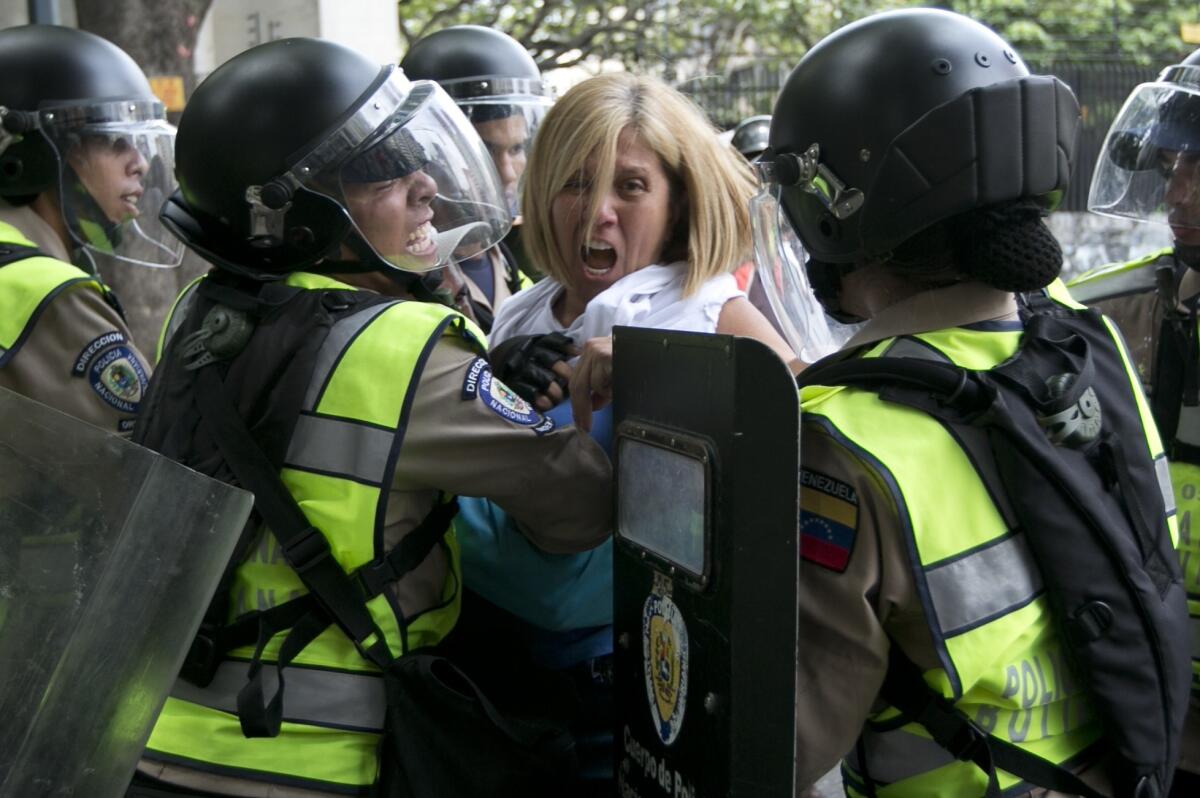Unrest continues to grip Venezuela as president threatens to make opposition-controlled legislature ‘disappear’

An anti-government demonstrator clashes with police during protests against the government of President Nicolas Maduro.
- Share via
Venezuela, already reeling from shortages of basic goods and electricity, plunged further into chaos Wednesday as police and opponents of President Nicolas Maduro clashed on the streets of the capital Caracas after Maduro threatened to make the opposition-controlled National Assembly “disappear.”
Maduro’s threats, scattered looting and growing protests over hyperinflation and food scarcities underscored the deepening unrest and polarization in this oil-rich but cash-strapped country. Maduro on Friday decreed a state of emergency, but the National Assembly subsequently voted it down as uncalled for.
Several protesters were arrested and at least one injured as police used tear gas to disperse a march to the national electoral council. Opposition leaders had planned to formally protest there the slow pace of a review of signatures on petitions backing a vote to recall Maduro. A similar march last week also was blocked.
Marchers carried signs reading “dying of hunger” and “there is no food.” Fearing a violent confrontation, stores along the march route were mostly closed.
As the food crisis continues and lines at markets lengthen, social media reported that looters broke into markets Tuesday night in Los Teques and Guarenas, both suburbs of the Caracas metropolis. Medicines and other vital products are in short supply.
In an attempt to impede attendance at Wednesday’s march, Caracas closed 14 subway stations, apparently on the orders of Mayor Jorge Rodriguez, a Maduro ally, He previously had said he would not permit the march to take place.
Maduro’s approval ratings have dropped to as low as 15% in recent polls, and the U.S. intelligence officials last week warned that the country is in danger of collapsing into waves of deadly violence.
In April, opposition members collected 1.8 million signatures supporting a referendum on Maduro’s removal from office, but critics, including National Assembly President Henry Ramos Allup, say the national election council charged with reviewing the petitions is using delaying tactics to derail the campaign.
In a news conference Tuesday night at the Miraflores presidential palace, Maduro said it is “just a matter of time” before the assembly “disappears,” although he didn’t offer details on how that might happen.
“I don’t think any Venezuelans expect anything good from the National Assembly,” Maduro said. Referring to the opposition, he said: “They don’t want a recall, they want an overthrow.” He said the recall campaign was illegitimate because it started too late in the assembly session.
The heated rhetoric was matched by opposition leader Henrique Capriles, a former presidential candidate and current governor of Miranda state who said Maduro’s apparent intention to go through with an emergency decree was unconstitutional. If the president tried to enforce the decree, Venezuela’s military might then face a “moment of truth.”
“Decide whether you are with the constitution or with Maduro,” Capriles said, referring to military leaders. He also urged Venezuelans to ignore any measures related to an emergency decree, since the National Assembly vote had made it illegitimate.
After the vote on Tuesday, Allup said the decree was an effort to divert Venezuelans from the “weakness” of Maduro’s government and that imposing emergency measures after a congressional rejection would be would be unprecedented.
“No one has ever dared to do this. He must be in a very desperate and weakened situation,” said Allup, who helped organized Wednesday’s protest march.
As the food crisis continues and lines at markets lengthen, social media reported markets were broken into Tuesday night in the cities of Los Teques and Guarenas, both suburbs of the Caracas metropolis.
In an attempt to impede attendance at Wednesday’s march, Caracas officials closed 14 subway stations, apparently on the orders of Mayor Jorge Rodriguez, a Maduro ally. He previously had said he would not permit the march to take place.
Marchers attempted to breach a cordon set up by riot police but were repulsed. The confrontation ended after electoral council member Luis Emilio Rendon arrived at the scene of the police blockage and accepted a petition from opposition leaders Allup and Capriles.
Capriles later told reporters at the scene that there was still time to carry out a recall referendum and “avoid a social explosion.”
In his news conference, Maduro said that a U.S. military aircraft has illegally entered Venezuelan air space. The U.S. State Department declined comment, but Gary Ross, a Pentagon spokesman, said the closest American aircraft was about 100 nautical miles away from Venezuela. “The claim that the U.S. violated Venezuelan territorial airspace is untrue,” Ross said in an email.
He added, “We routinely fly detection and monitoring flights in the region to counter and disrupt illicit trafficking. It is a region with a known history of illicit maritime trafficking.”
Also during his Tuesday speech, Maduro called Organization of American States General Secretary Luis Almagro a “traitor” for having urged Maduro to respect constitutional separation of powers.
Almagro responded in a statement Wednesday saying the traitor is Maduro.
“You betray your people and your supposed ideology with your rambling tirades,” Almagro said. “You are a traitor to ethics in politics with your lies and you betray the most sacred principle in politics, which is to subject yourself to the scrutiny of your people.”
MORE FROM WORLD
In post-impeachment Brazil, the new conservative Cabinet is 100% white men
Produce industry giants team up to promote responsible labor practices
Mexican president proposes legalizing same-sex marriage
Special correspondents Mogollon and Kraul are based in Caracas and Bogota respectively.
UPDATES:
5:40 p.m.: This article was updated to include comments from Pentagon spokesman Gary Ross.
This article published at 3:18 p.m.
More to Read
Sign up for Essential California
The most important California stories and recommendations in your inbox every morning.
You may occasionally receive promotional content from the Los Angeles Times.










